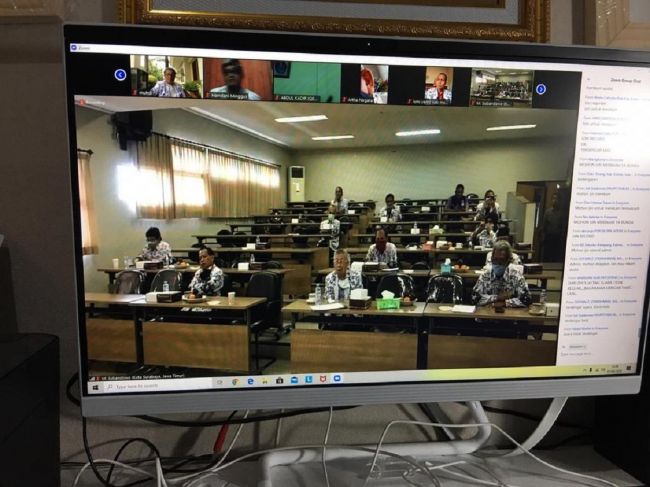Indonésie: des syndicalistes de l’éducation prennent rapidement des mesures face à la pandémie de COVID-19
En Indonésie, la fermeture des écoles, des universités et autres établissements scolaires a eu lieu le 16 mars, privant plus de 68 millions d’élèves de tout enseignement en présence d’un∙e enseignant∙e.
Depuis cette date, le « Bureau national du PGRI et les bureaux du PGRI à tous les niveaux, continuent d’intervenir pendant la pandémie de COVID-19 », selon la présidente du Persatuan Guru Republik Indonesia (PGRI), Unifah Rosyidi. « La distanciation sociale et physique imposée par le gouvernement n’a pas empêché le PGRI de poursuivre ses activités. »
La technologie et les plateformes numériques ont permis au PGRI d’organiser des réunions virtuelles. Le 7 avril dernier, il a tenu avec succès sa première conférence de travail virtuelle à l’échelon national, à laquelle ont participé cinq cents membres des Comités du bureau de PGRI au niveau national, régional et local.
« Les interventions du PGRI visent à renforcer notre identité en tant qu’organisation professionnelle, qu’organisation faisant du lobbying et en tant que syndicat d’enseignants », a ajouté Rosyidi.
« Les interventions du PGRI visent à renforcer notre identité en tant qu’organisation professionnelle, qu’organisation faisant du lobbying et en tant que syndicat d’enseignants », a ajouté Rosyidi.
Propositions au gouvernement
Le PGRI a proposé que le gouvernement :
- Remanie temporairement l’apprentissage en présentiel en classe et se tourne vers l’enseignement à distance par le biais de TIC, de plateformes en ligne ou en donnant des devoirs par courriel ou via des plateformes de messagerie, au moyen de programmes d’e-learning ou de classes virtuelles.
- Stoppe temporairement toutes les activités scolaires impliquant un grand nombre de personnes, et ne participe à aucune compétition inter-écoles.
- Distribue immédiatement un “Guide de l’enseignement et de l’apprentissage à distance” destiné aux enseignant∙e∙s, aux élèves et aux parents, en vue de garantir un apprentissage efficace. Ce guide a pour objectif d’éviter aux élèves de s’ennuyer ou de se fatiguer, de présenter aux enseignant∙e∙s des modèles d’enseignement alternatifs en ligne et hors ligne ; et de veiller à ce que les parents accompagnent sereinement leurs enfants dans l’apprentissage en ligne.
- Affecte les fonds prévus pour l’annulation de l’examen national, à la riposte contre le COVID-19 et aux enseignant∙e∙s touché∙e∙s.
- Accorde une attention particulière aux enseignant∙e∙s contractuel∙le∙s pendant la pandémie de COVID-19, en particulier ceux∙celles qui se trouvent dans des zones marginalisées, reculées et touchées par des conflits, au moyen de primes spéciales relevant de l’allocation budgétaire nationale ou régionale.
- Utilise d’autres plateformes médiatiques, notamment la chaine de télévision nationale, pour diffuser divers programmes éducatifs, car la télévision nationale dispose d’une vaste amplitude de diffusion qui couvre aussi les îles reculées. Le ministre de l’Éducation et de la Culture a élaboré un programme pour « apprendre chez soi » en collaboration avec la chaine de télévision nationale d’Indonésie, TVRI, qui diffuse des émissions à contenus éducatifs.
- Paye des indemnités aux enseignant∙e∙s pendant les trois premiers mois, sans exigence de s’acquitter de l’ensemble de la charge de travail pendant la pandémie COVID-19.
- Continue à payer le 13e mois de salaire et les primes dues aux enseignant∙e∙s, aux professeur∙e∙s d’universités et aux personnels de soutien dans l’éducation.
Le syndicat d’enseignants recommande aussi fermement aux enseignant∙s∙s et aux parents d’œuvrer conjointement pendant la pandémie de COVID-19, a ajouté Rosyidi.
Mise en place de centres de crise par les syndicats
Le PGRI a chargé les membres de ses comités à tous les niveaux, de mettre en place un centre de crise/une association de professionnels dans les matières scolaires (APKS) en coordination avec les gouvernements régionaux, afin de développer et de fournir aux éducateur∙trice∙s des ressources pédagogiques et des modèles d’enseignement à distance. Ce centre de crise devra également aider les enseignant∙e∙s dans les zones marginalisées, reculées et touchées par des conflits à combattre le COVID-19 et à y répondre.
Le syndicat a instauré des centres de crise dédiés au COVID-19 à l’échelon des provinces, des quartiers et des villes en vue d’aider les gouvernements régionaux en termes de prévention et de riposte face au COVID-19, et de soutenir les communautés affectées en collectant des dons et en distribuant de produits de base, des kits hygiéniques et sanitaires, et des équipements de protection au personnel médical.
Le syndicat de l’éducation a également invité ses membres à reporter toute conférence à l’échelon des districts et des villes au plus tard jusqu’en décembre 2020, et à participer à des actions solidaires auprès des communautés affectées par le COVID-19.
Formation en ligne
Fidèle à son identité en tant qu’organisation professionnelle d’enseignants, le PGRI a également dispensé plusieurs formations en ligne, notamment par la diffusion de vidéos en temps réel sur YouTube, via des discussions par messagerie en ligne ou sur des plateformes de conférences en ligne telles que Skype ou Zoom. Le Smart Learning Centre (Centre de formation « intelligente ») du PGRI propose des formations sur l’apprentissage numérique en diffusion continue sur YouTube. Les éducateur∙trice∙s du syndicat ont également lancé le programme COVID-19 à destination des enseignant∙e∙s, qui dispense des formations en ligne aux enseignant∙e∙s dans toute l’Indonésie, et pour lequel des membres du Bureau de l’APKS et du Bureau exécutif national de PGRI interviennent en tant que personnes ressource ou facilitateur∙trice∙s.
« Nous souhaitons également exprimer notre profonde reconnaissance au personnel médical pour leur engagement et leur dévouement en tant ‘qu’héros humanitaires’ durant la pandémie de COVID-19 », a souligné Rosyidi.
Toile de fond
Le compte-rendu des actions menées par le PGRI durant la pandémie de COVID-19 a été publié le 21 avril dernier et le rapport est disponible ici (en anglais).

[Thu, 07 May 2020 15:36:00 +0000] | DIGG THIS
Website Development and Design by Cyblance
